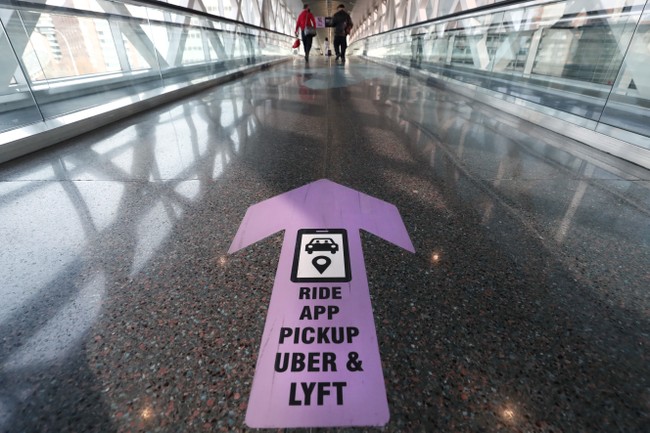
Yesterday, some drivers for ride-share companies Uber and Lyft in the United States went on strike, hoping to disrupt travel plans on Valentine’s Day to draw attention to their demands. A number of delivery drivers for Uber Eats, Deliveroo, and others in both the U.S. and the U.K. similarly logged off and refused to log in on those apps. Spokespeople for the drivers said they were demanding better pay and other changes to their working conditions. But by the time the walkout concluded, there were significant questions as to whether the alleged strike had any impact at all or if the companies would even notice. (Associated Press)
Thousands of ride-hailing and delivery workers in the U.S. and the U.K. went on strike on Valentine’s Day, calling for higher pay and other changes to their working conditions.
In the U.S., Uber and Lyft drivers planned daylong strikes in Chicago; Philadelphia; Pittsburgh; Miami; Orlando and Tampa, Florida; Hartford, Connecticut; Newark, New Jersey; Austin, Texas; and Providence, Rhode Island. Drivers were also holding midday demonstrations at airports in those cities, according to Justice for App Workers, the group organizing the effort.
Meanwhile, U.K. delivery drivers for Uber Eats, Deliveroo, Just Eat and Stuart said they would turn off their apps and refuse deliveries between 5 p.m. and 10 p.m. The group Delivery Job U.K., which called for the walkout, said on Instagram that the strike was “a crucial opportunity to be seen and heard by society.”
The AP spoke with a dozen or so drivers in both countries. They all voiced the same complaints, saying that their income had decreased in recent months and they wanted increases in the minimum fares paid for each ride. They also expressed concerns over safety and the companies’ policies regarding drivers being deactivated on the apps.
From the beginning, there have been questions as to whether or not the drivers should even be allowed to go on strike. They’re not actually employees. They’re private contractors. They set their own working hours and how much they earn depends entirely on how much time they put in, how many rides they take, and the quality of the service they provide.
It’s also unclear if the rideshare companies are able to meet any of these demands in a practical fashion because the situations the drivers are complaining about are largely beyond the control of Uber, Lyft, and others. They haven’t lowered the rates being paid to the drivers. If they are earning less, they are getting fewer rides. In a tough economy, people have less money to go out for dining, entertainment, or anything beyond basic necessities. Fewer people needing transportation translates to fewer customers on the app and less income. Tipping likely goes down as well. The companies don’t control that.
The effectiveness of the strike appears to be either minimal or none at all. A spokesperson for Uber said, “We’ve seen no impact to our operations or reliability for riders.” They argued to the contrary, saying there were actually more drivers available on the app yesterday evening than during the same period the previous week. There were many headlines in the news about the strike, but it appears that most drivers were taking advantage of the somewhat reduced competition for riders on a holiday when people traditionally go out to dinner and to parties.
Even if the strike had succeeded, those parties are one reason the overall effect might have been broadly deleterious. If people who may have had one too many glasses of wine with their date opened up their app and no riders were available, how many of them would have given up in frustration and just risked driving home? If one of the effects of your strike is to produce more drunk drivers on the road, you’re not likely to garner a lot of popular support.
Being a rideshare driver isn’t for everyone and it’s not suited to every lifestyle. If it’s not working out for you, you should probably look for a different line of work. If you get a CDL, there is still a vigorous demand for long-haul truck drivers and the pay in that profession is pretty good.
